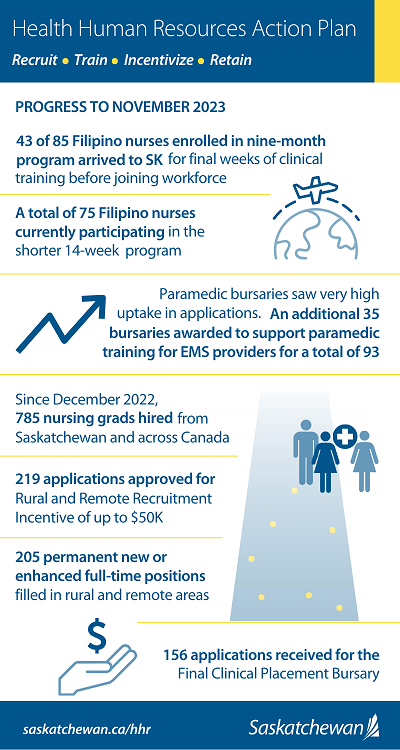Released on November 2, 2023
EMS Bursary Program Expanded Following High Uptake in Applications
Forty-three Internationally Educated Nurses (IENs) from the Philippines have now arrived to Saskatchewan and are participating in on-site clinical training. Once they complete clinical training, the Filipino IENs will be eligible for licensure and ready to begin working in Saskatchewan's health care system before the end of December.
“Our government is committed to ensuring our Saskatchewan nurses feel supported in their role and are appropriately staffed to meet an increase in demand on our health care system,” Health Minister Everett Hindley said. “We look forward to these highly qualified nurses joining health care teams across the province and making a valuable contribution to patient care. We are very pleased they chose to make Saskatchewan their home and build a career here in our great province.”
More than 400 IENs from the Philippines have received conditional offers of employment from the Saskatchewan Health Authority (SHA) to work in the province. Of these, 85 are completing a nine-month program, including 43 that are currently participating in clinical training in Saskatchewan. An additional 75 IENs from the Philippines have enrolled in online training as part of the 14-week Transition to Registered Nursing in Canada (TRNC) and will continue arriving in Saskatchewan in the coming weeks for clinical training.
Fourteen IENs residing in Canada have completed training and begun their employment journey in Saskatchewan. A further 19 Ukrainian newcomers have also been hired into the SHA’s workforce. The SHA has had great success in attracting new nursing graduates from Saskatchewan and out-of-province with 785 having been hired since December 2022.

This past July, government announced one-time funding of $530,000 to provide a total of 58 bursaries to support paramedic training for EMS providers in both rural and urban service locations across the province. All 58 bursaries have been awarded. Due to the high rate of application uptake, government expanded the EMS bursary program by an additional $290,000 to award a further 35 bursaries for a total of 93 bursaries.
“The level of interest these bursaries successfully generated in the EMS field is very encouraging as we work to stabilize this critical front line health care service,” Hindley said.
The bursaries ranged from $5,000 to $10,000 and the application process for this program is now closed.
Work continues on multiple initiatives under Saskatchewan's HHR Action Plan to recruit, train, incentivize and retain more health care workers and progress is being made in key areas.
HHR Progress Update Highlights
- Newly introduced to Saskatchewan as a health profession for the first time, Physician Assistants will soon be joining health care teams to help provide enhanced care and strengthen the health system. Twelve Physician Assistant positions will be posted in communities across the province. Current opportunities are available at HealthCareersInSask.ca.
- The government has asked the University of Saskatchewan’s College of Medicine to develop a new two-year Physician Assistant Master’s program that will begin in fall 2025. Establishing this new training program means more opportunity for Saskatchewan residents to train and build a career right here at home in this new field. There is also the opportunity to customize it for the unique needs of Saskatchewan’s health care.
- 82 per cent of positions have been filled of the 250 new and enhanced permanent full-time positions targeted in nine high-priority occupations to stabilize staffing in rural and remote areas of the province.
- The Rural and Remote Recruitment Incentive of up to $50,000 offered to new employees in nine high-priority health occupations continues to see success with 219 incentives approved to date. This incentive is now available in 54 rural and remote communities across Saskatchewan.
- The Final Clinical Placement Bursary continues to see interest with 156 applications received since April 1, 2023. Applications are open for the fall call out through March 1, 2024. Those interested can visit the Final Clinical Placement Bursary webpage for information on eligibility criteria and application process.
Details on health care opportunities, how to access them and more information on the province's HHR Action Plan are available at saskatchewan.ca/HHR.
-30-
For more information, contact:
Media Relations
Health
Regina
Phone: 306-787-4083
Email: media@health.gov.sk.ca

